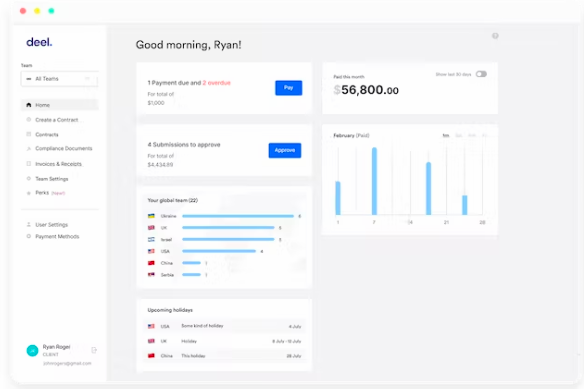In a post-pandemic world where 65% of employees are looking to work from home permanently, a global mobility programme might be the solution employers need.
Global mobility and the mobility of employees is a complex and growing phenomenon that touches nearly every industry and corner of the world. Find out about global mobility below and how to successfully manage a global mobility programme from NoHQ - your no-nonsense guide to remote working strategies.
What is global mobility?
Global mobility is the umbrella term for strategically moving employees worldwide and their dependents for financial, professional and personal growth.
Whilst abroad, staff can adapt to their new surroundings, learn about the new consumer market around them and help the company expand into these areas. Employees can also experience the benefits remote work, such as a better work-life balance, mental health and personal development.
In return, employers see increased work, employee loyalty, and a deeper connection with new markets.
What is global mobility management?
This is the process of managing the movement of employees between countries. It involves managing entire moves and transitions, including travel, accommodation and other aspects essential to ensure a smooth transition.
Global mobility management needs to be ever-evolving to ensure the well-being of remote employees. Managing these programmes is made more accessible through technology and global mobility software.
Why is global mobility management critical?
With an effective global mobility programme, you can:
- Reduce costs: eliminate the costs of hiring new employees in remote locations by relocating the ones you already have.
- Save time: you won’t need to spend time on compliance processes, such as visa applications, that come with hiring remote employees or completing lengthy training as your staff already know everything they need to begin.
- Scale your business: with 65% of the workforce looking for remote work, offering these global opportunities will attract more interest in working for your company. In addition, with increased business opportunities abroad, employees can help expand your brand and, in turn, attract more people to your workforce.
- Accessing more talent: You can access previously unreachable talent by hiring overseas or stationing existing employees to set up a new office branch.
- Worldwide brand values: You can establish your brand values with a global mobility programme. Companies like HSBC have done this. Walk through any international airport, and HSBC’s ‘Connecting with the World’ campaign creates an atmosphere of togetherness and expands its reach. HSBC also boasts one of the world’s most successful global mobility programmes.
How to successfully create a global mobility programme.
Increase the visibility of global mobility programmes
Your employees will be your greatest asset in creating a thriving global mobility programme. They are the ones who will be traveling, and they need to feel engaged in the process. Have an employee engagement strategy that includes:
- Ensuring employees are aware of global mobility programmes.
- A clear communication plan outlining the importance of communicating regularly with staff on matters related to global mobility programmes
- Regular updates about progress on implementing programmes and initiatives related to global mobility programs
Understand the challenges that come with moving constantly
Companies must consider the compliance challenges of managing global teams across borders and the security risks associated with such moves.
These challenges are often addressed through establishing global mobility policies (including employment contracts) and processes for handling employee transfers between countries - including finding suitable accommodation for relocated staff members upon arrival in their new location(s).
Thoroughly research the country you plan to expand in. Then, understand what you must do to transfer your employees there safely.
Support employees with global mobility software
Global mobility software, like Deel, ReloTalent and MoveAssist, specialize in global mobility solutions and help companies cope with challenges related to distributed teams. For instance, Deel can provide visas for your company if your employee wants to relocate to selected countries, such as the United Kingdom.

Create strong brand ideals within your business for employees to take with them overseas
The key to successfully scaling a business internationally is consistency. The brand ideals you’ve worked hard to produce in your business’ parent country should integrate seamlessly into global offices.
When you build branches abroad, consider hiring leaders that understand your work culture and can translate that in a new region. Customers expect consistency, and a thriving global mobility programme can support this.
Take cultural values into consideration
When you move to a new country, some of your brand ideals and theirs may not align. For example, IKEA, famous for its self-assembled furniture, Swedish values and restaurant inside the store, had to remove the serving of beef Swedish meatballs in a Hindu country.
To properly expand overseas, you must thoroughly research integral cultural values that may have to change.
Going global
Global mobility is an excellent solution for remote businesses that want to expand their business overseas. However, before you make this decision, you must conduct thorough research into different countries and cultures to understand their values and relocation processes.
With the support of global mobility software to manage international assignments, you can communicate with employees easily and create consistency across the board. In addition, it helps with the communication and coordination required to run these programmes effectively, so you must choose the right tool for your business needs.
Go global today for increased revenue, brand awareness and an untapped reservoir of talent waiting for you across the sea.
